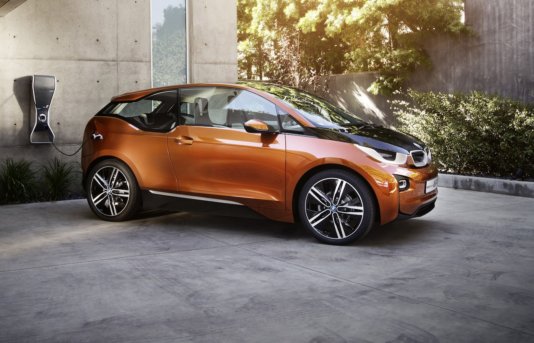- About
- Topics
- Picks
- Audio
- Story
- In-Depth
- Opinion
- News
- Donate
- Signup for our newsletterOur Editors' Best Picks.Send
Read, Debate: Engage.
| July 31, 2013 | |
|---|---|
| tags: | #BMW i3, #carbon emissions, #green technology |
| located: | Germany, USA |
| by: | Itai Lahat |
Take for example the passenger cabin. It is the first-ever mass produced Carbon Fiber Reinforced Plastic (CFRP) passenger cell in the automotive business, and is a big factor in the cars efficiency. "Carbon Fiber Reinforced Plastic is equally as strong as steel, while being 50% lighter, and 30% lighter than aluminum. The result is an electric car that weighs about 1225kg", says the company. The Drive Module is constructed of 100% aluminum, also saving weight compared to steel. This enables the new i3 to generate 170 HP and make it from 0 to 100 Kmh in 7 seconds.
The BMW i3 is powered by a lithium-ion battery. BMW claims a real-world range of 130 - 160 km in everyday driving, something that can be increased by up to approximately 12% in ECO PRO mode, and by the same amount additionally in ECO PRO+ mode. The charging time is 3 hours in 220 V. Optional SAE DC Combo Fast Charging allows for 100% in 30 minutes
The company continued its efforts to create an environmentally responsible interior. The instrument panel surround and door trim use fibers from Kenaf plant. Carbon fiber reinforced plastic (CFRP) roof panel is made partially with recycled CFRP from manufacturing process of other components. 25% of plastic used in interior originates from recycled materials. The dashboard wood trim is crafted from responsibly-forested eucalyptus. The CFRP components are sustainably produced in Moses Lake, WA, USA, where the factory uses hydroelectric power. The German Leipzig assembly plant uses wind-generated electricity. And olive-leaf extract is used to tan interior leather surfaces.
Pricing for the American market starts at $41,350. But after federal tax credits and state incentives, the price drops to around $30k. here in Europe it will cost around 35 thousand euros, which is 20 percent more than the base version of BMW's best-selling 3-Series. BMW needs to deal with a big challenge. A study released by the Essen-based Center Automotive Research found that in the first half year of 2013, only 580 electric cars were sold in Germany, and 35 times as many in the US. German Chancellor Angela Merkel set a target of 1 million such vehicles on the country's roads by the end of the century, but so far only about 1,700 have been registered.
Image: BMW
By copying the embed code below, you agree to adhere to our republishing guidelines.

